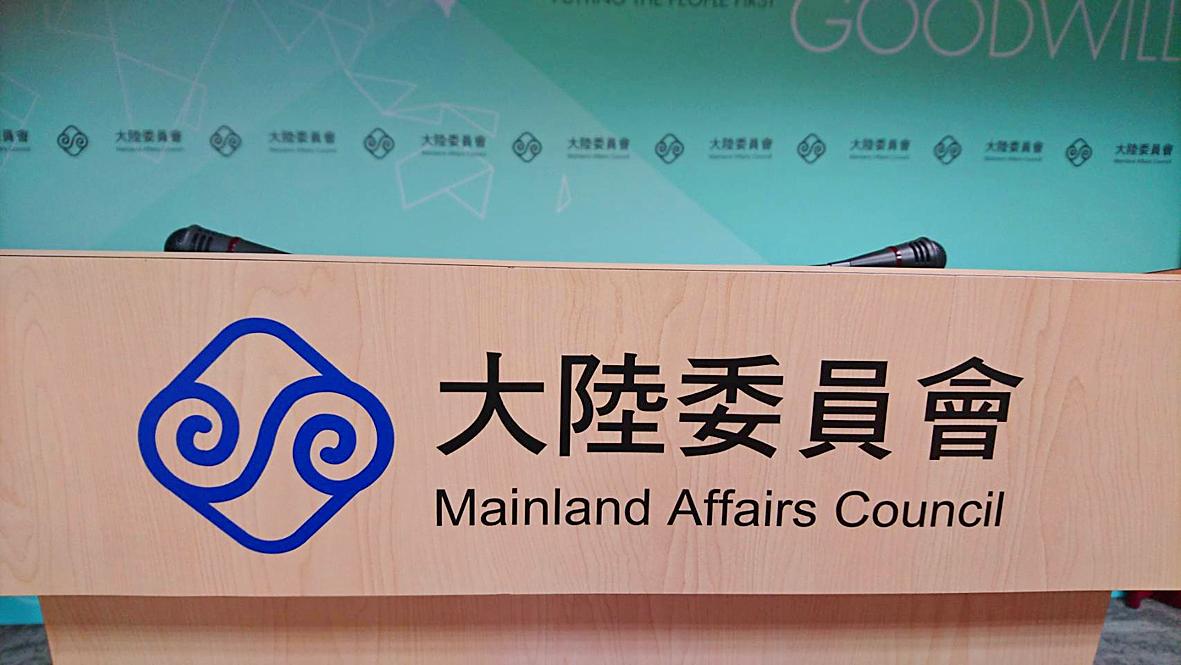Taiwanese officials in Hong Kong have been told that their visas would not be renewed if they do not sign a document supporting Beijing’s claim to Taiwan under its “one China” principle, sources have said.
Several officials at Taiwan’s de facto Hong Kong consulate who were due to renew their visas have been asked by the Hong Kong government to sign the document, a senior Taiwanese official with knowledge of the matter told Reuters.
The move is unprecedented and presents an “unnecessary political obstacle” for Taipei-Hong Kong ties, the official said.

Photo: Chung Li-hua, Taipei Times
“They won’t issue the visa if we don’t sign the document,” the official said, declining to be named due to the sensitivity of the matter. “We will try our best to defend our stance. Our representatives in Hong Kong will hold fast to their position.”
The Hong Kong Immigration Department did not immediately respond to a request for comment.
Mainland Affairs Council Minister Chen Ming-tong (陳明通) on Thursday said that the Hong Kong government is establishing unnecessary red tape outside of established bilateral regulations recognized by Taipei and Hong Kong, adding that Taiwan would “never accept” politically motivated preconditions.
Chen made the remarks when asked about the Hong Kong government reportedly demanding that the Taipei Economic and Cultural Office in Hong Kong sign a document agreeing to Beijing’s “one China” principle before the visa of Acting Representative to Hong Kong Kao Ming-tsun (高銘村) would be renewed.
While declining to confirm the report, Chen said that the Hong Kong government had “set up an unnecessary hurdle.”
Taipei has refused the demand and Kao is returning to Taiwan, the sources said, adding that despite not having a representive on site, the office would be maintained until the situation becomes untenable.
Taiwan would resolutely uphold its national interests and the dignity of Taiwanese in light of the controversial national security legislation imposed by Beijing in Hong Kong, the council said.
Stating that Taiwan seeks to function normally in Hong Kong and maintain normal interactions, the council urged the Hong Kong government to return to established norms agreed on by both sides and to maintain goodwill.
The office has five divisions — consular affairs; news and culture; general; economy; and contact — and its officials are on three-year rotations.
The consular affairs and general divisions are staffed by council officials, while the news and culture division is staffed by the Ministry of Culture’s Kwang Hwa Information and Culture Center.
Of the office’s five division heads, only Economy Division Director Ni Po-chia (倪伯嘉) remains, although the office’s consular and visa services are ongoing, sources said.
Consular Affairs Director Chou Chii-jui (周家瑞) and General Division Director Lee Chin-mei (李晉梅) have also returned Taiwan because of expired work visas, sources said, adding that the Hong Kong government has yet to respond to the office’s requests to extend their visas.
Taiwan maintains its stance that it is an independent and sovereign nation, Premier Su Tseng-chang (蘇貞昌) said yesterday, adding that Taiwan greatly welcomes capital or talented people wishing to relocate from Hong Kong.

OPTIMISTIC: The DGBAS sharply upgraded its GDP growth estimate from 3.54 percent to 7.71 percent after the Taiwan-US trade agreement signing and given AI optimism The US imported more from Taiwan than China for the first time in decades, as US President Donald Trump’s tariffs reshape trade flows while a global boom in artificial intelligence (AI) fuels demand for tech products. US purchases of goods from China plunged almost 44 percent in December last year from 2024 to US$21.1 billion, US Department of Commerce data showed on Thursday. By contrast, shipments from Taiwan more than doubled during the same period to US$24.7 billion. The soaring Taiwanese shipments to the US reflect the huge expansion in supplies of chips and servers for AI companies, which has completely changed

NON-NEGOTIABLE: The US president’s action ran counter to one of the US’ ‘six assurances’ on not consulting China about arms sales to Taiwan, US lawmakers said US President Donald Trump’s admission that he is discussing arms sales to Taiwan with Chinese President Xi Jinping (習近平) is “alarming and a blatant violation of US policy and the six assurances,” US Representative Ro Khanna said on Tuesday. Trump on Monday said he would decide soon on whether to send more weapons to Taiwan, after Xi warned him not to do so. “I’m talking to him about it. We had a good conversation, and we’ll make a determination pretty soon,” Trump told reporters aboard Air Force One when asked about warnings raised by Beijing during a phone call with Xi over

The Central Election Commission has amended election and recall regulations to require elected office candidates to provide proof that they have no Chinese citizenship, a Cabinet report said. The commission on Oct. 29 last year revised the Measures for the Permission of Family-based Residence, Long-term Residence and Settlement of People from the Mainland Area in the Taiwan Area (大陸地區人民在台灣地區依親居留長期居留或定居許可辦法), the Executive Yuan said in a report it submitted to the legislature for review. The revision requires Chinese citizens applying for permanent residency to submit notarial documents showing that they have lost their Chinese household record and have renounced — or have never

US and Chinese fighter jets briefly faced off above waters near the Korean Peninsula this week, Yonhap News agency reported, marking a rare confrontation in that area between the two superpowers. About 10 US fighter jets on Wednesday departed an airbase in Pyeongtaek, South Korea, for drills above international waters off South Korea’s western coast, the news outlet cited unidentified military sources as saying. While the US planes did not enter China’s air defense identification zone, Beijing scrambled planes as they neared that region, the report said. “The Chinese People’s Liberation Army organized naval and air forces to monitor and effectively respond